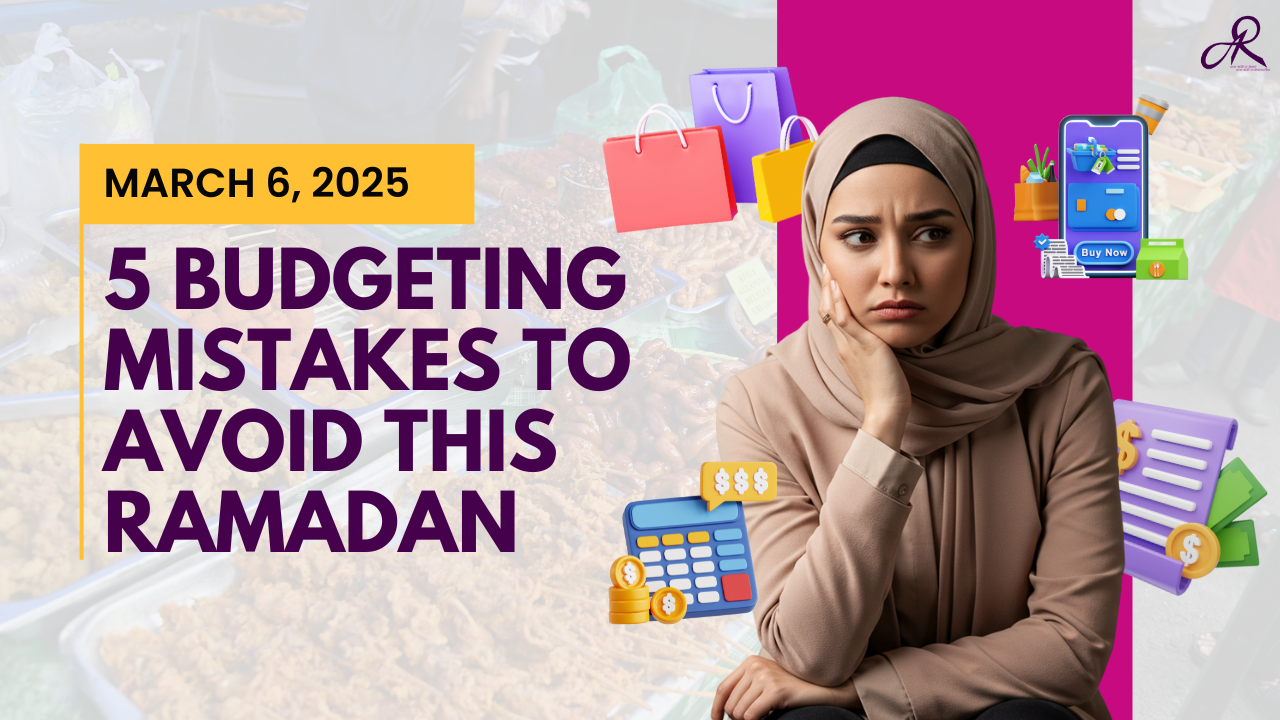Ramadan is a month of spiritual growth, self-reflection, and generosity. However, it can also become a season of increased spending if you’re not careful. Between preparing for iftar, giving to charity, and getting ready for Eid, it’s easy to lose track of expenses. Without a clear financial plan, you might find yourself overspending, struggling to meet your obligations, or even accumulating debt.
To help you maintain financial balance while honoring the spirit of Ramadan, here are five common budgeting mistakes to avoid—and practical solutions to keep your finances in check.
- Overspending on Iftar and Sahur

The Mistake: Preparing excessive or lavish meals leads to food waste and drains your budget.
The Solution:
- Plan weekly menus and stick to a grocery list.
- Focus on simple, nutritious meals following the Sunnah (dates and water to break your fast).
- Share bulk ingredients with family or friends to save costs.
- By practicing mindful meal planning, you not only reduce waste but also save money while staying true to the essence of Ramadan.
- Ignoring a Clear Ramadan Budget
The Mistake: Without a set budget, expenses for food, charity, and Eid preparations can spiral out of control.
The Solution:
- Create a Ramadan-specific budget that includes food, donations, and festive spending.
- Track your spending weekly using a budgeting app or simple spreadsheet.
- Allocate a percentage of your income to charity while saving for future needs.
- A clear financial plan allows you to meet your spiritual obligations while ensuring you stay financially secure.
- Last-Minute Eid Shopping

The Mistake: Rushing to buy clothes, gifts, and decorations at the last minute often leads to overspending and impulse buying.
The Solution:
- Plan and purchase Eid essentials early to take advantage of discounts.
- Set spending limits for gifts and focus on meaningful, affordable items.
- Consider DIY gifts or personalized gestures to save money.
- Shopping early and mindfully helps you avoid the financial strain of last-minute purchases while still enjoying the Eid celebrations.
- Forgetting to Set Aside Zakat and Sadaqah
The Mistake: Not prioritizing Zakat and other charitable obligations can lead to scrambling for funds later.
The Solution:
- Calculate your Zakat accurately using online calculators like Zakat Selangor.
- Automate monthly Sadaqah to spread out giving without disrupting your budget.
- Focus on both local and global causes while managing your financial commitments.
- By planning your charity in advance, you fulfill your religious duties while maintaining a balanced financial life.
- Falling for Marketing Traps
The Mistake: Flash sales, “Ramadan specials,” and online promotions can lead to unnecessary purchases.
The Solution:
- Differentiate between “needs” vs. “wants” before making a purchase.
- Use the 24-hour rule—wait a day before buying non-essential items.
- Set spending limits for online purchases and avoid impulse-driven social media ads.
- By being mindful of marketing tactics, you can protect your finances while still enjoying the blessings of Ramadan.
Ramadan is not just about spiritual renewal—it’s also an opportunity to cultivate better financial habits. By avoiding these common budgeting mistakes—overspending on food, failing to plan, and giving without structure—you can maintain financial stability while fully embracing the blessings of this holy month.
Remember, financial mindfulness is an extension of your faith. As you fast, reflect, and give during this sacred time, let your spending reflect your values of simplicity, generosity, and gratitude.
Ready to take control of your finances?
Download our free eBook packed with expert tips and strategies that can help you start building a secure financial future today!
Follow us on Instagram and Facebook to get the latest updates on our programs, exclusive insights, and valuable financial tips. Be the first to know about upcoming events and opportunities designed to help you secure your future. Don’t miss out—join our community today!








